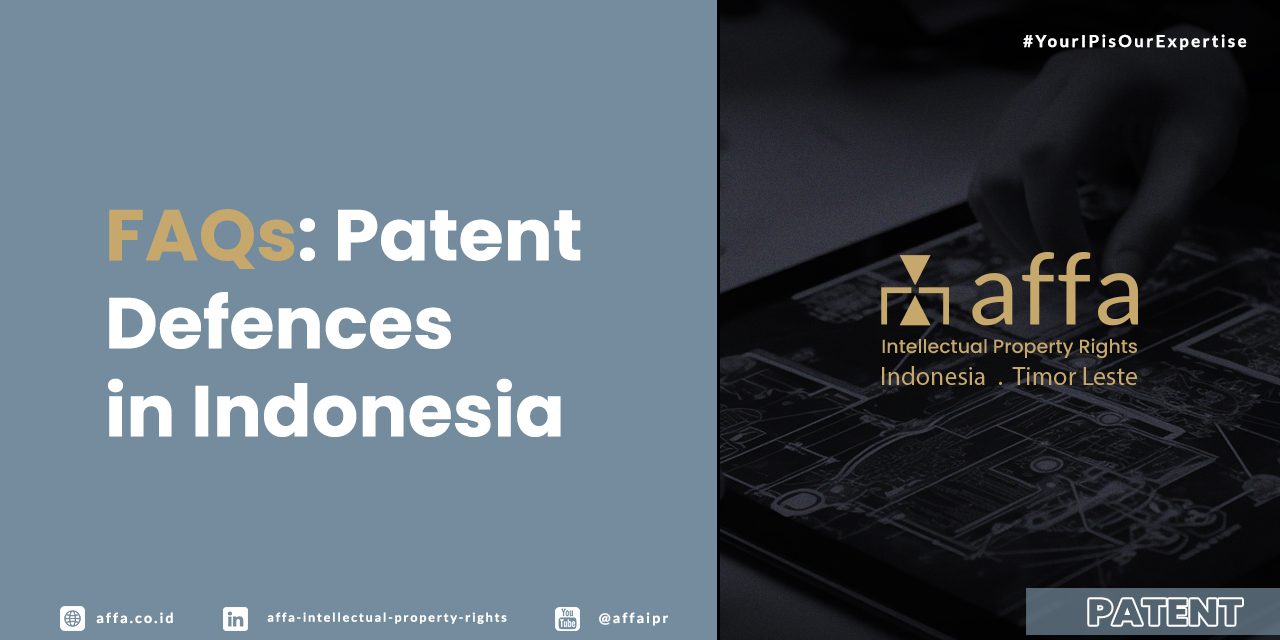Patent Invalidity
Q: How and on what grounds can the validity of a Patent be challenged? Is there a special court or administrative tribunal in which to do this?
A: Article 130 of the Indonesian Patent Law regulates several grounds to invalidate a Patent. Most notably, an invalidation decision issued by the Court of Commerce or the decision by the Patent Board of Appeal.
According to article 132 of the Patent Law, there are several grounds that can be used to challenge the validity of a registered Patent at the Court of Commerce (It should infringe articles 3, 4 and 7 of the Patent Law – therefore the patent should have not been granted). On the obvious level, a Patent may be susceptible to invalidation if it is not considered novel, does not have inventive steps, or is not industrially applicable. For simple Patents, the plaintiff can simply challenge its novelty and industrial application. On more specific notes, a Patent registration can be challenged if it infringes article 4 (list of the things not considered as inventions) and article 9 (list of inventions that cannot be granted Patents) of the Patent Law.
Another practical invalidation method is to see if the plaintiff has worked its Patent in Indonesia pursuant to article 20 of the Patent Law, which states that a registered Patent must be worked or used in Indonesia to remain in force. Failure to work or use the patent in Indonesia may result in any third party fling for invalidation of the Patent at the court of commerce. However, to date, there has not been any challenge against the non-compliance of article 20 in Indonesia.
Also, a Patent registration may also be invalidated if it fails to disclose the source of genetic resources and/or traditional knowledge in the Patent description document (see article 26 of the Patent Law).
The burden of proof lies with the plaintiff.
Absolute Novelty Requirement
Q: Is there an ‘absolute novelty’ requirement for patentability, and if so, are there any exceptions?
A: The Patent Law and the examination guideline issued by the Patent Office adopt the ’absolute novelty’ approach. It simply states that the Patents examined shall only be registered if they are deemed novel – which means there should be no similar or identical invention at the time of fling. However, the Patent Law allows the disclosure of an invention for education research and development purposes for up to six months before the filing date, and even 12 months in the event the disclosure was made due to a trade secret infringement.
Obviousness or Inventiveness Test
Q: What is the legal standard for determining whether a Patent is ‘obvious’ or ‘inventive’ in view of the prior art?
A: The patent examination guideline issued by the Patent Office does not stipulate further about the ’obviousness or inventive test’. It simply states that the patents examined shall only be registered if they have inventive steps.
Patent Unenforceability
Q: Are there any grounds on which an otherwise valid Patent can be deemed unenforceable owing to misconduct by the inventors or the Patent owner, or for some other reason?
A: The Patent Law does not regulate the unenforceability of a registered Patent owing to misconduct by the inventors or the Patent owner.
Prior User Defence
Q: Is it a defence if an accused infringer has been privately using the accused method or device prior to the filing date or publication date of the Patent? If so, does the defence cover all types of inventions? Is the defence limited to commercial uses?
A: The Patent Law also provides an opportunity for a prior user of a disputed Patent to defend itself if that user can prove that the use of the disputed patent does not rely on a specification, claims and figures identical to those of the registered Patent. Nevertheless, the prior use must be recorded at the Patent Office to be officially recognised as such (see article 14 of the Patent Law).
Should you need more information regarding Patent defences in Indonesia, please do not hesitate to contact us via [email protected].







